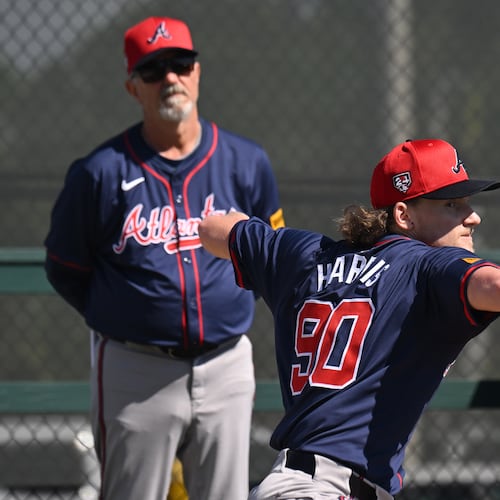For the first time in almost two decades, the Braves are preparing for another round of the postseason. They swept the Reds 2-0 in a best-of-three wild-card round to advance to the National League Division Series, where they’ll face either the Cubs or Marlins in Houston.
The Braves should come away from the first round beaming with optimism. They managed only six runs but held the Reds scoreless across 22 innings. In a season where their offense has carried them to so many wins, the Braves turned to their pitching when it mattered most.
So what can we take away from that 48-hour stretch?
For one, we saw the Braves don’t need to out-slug their opponent to win. They knew they could win a variety of games, but doing so in the postseason is a different challenge. They faced Cy Young front-runner Trevor Bauer and strike-out specialist Luis Castillo. They managed only one combined run off them yet won both games.
Freddie Freeman had the best postseason moment of his career Wednesday, when his walk-off single won Game 1. Game 2 was deadlocked until the fifth, when Ronald Acuna’s doubled scored the first run, and the Braves broke it open with the only two homers in the series three innings later.
“You’re going to have to win these kind of games in the playoffs,” Freeman said after Game 1. “These are the kind of wins that can propel you going forward and give you that momentum.”
A line uttered few times this year: The Braves' pitching compensated for their offense. Max Fried’s first postseason start was stellar. He produced seven scoreless innings, matching Bauer pitch-by-pitch. Fried checked every box, mentally and physically.
As sharp as Fried was, Ian Anderson might’ve been better. He struck out nine over six scoreless innings, dazzling Reds hitters with his three-pitch mix. It was only his seventh MLB start – SEVENTH – and he carried himself like an individual pitching in his fifth postseason run.
The playoff stage affects players differently. Anderson could’ve fallen apart in his first postseason start. He could’ve folded as early as his 34-pitch second inning. Instead, the Braves received their third outstanding first-time postseason outing in their past two playoff runs, following Fried’s and Mike Soroka’s impressive debuts.
Catcher Travis d’Arnaud saw similarities between Anderson and the younger versions of Jacob deGrom and Noah Syndergaard in 2015, when d’Arnaud was part of a Mets team that rode its young pitching to a World Series berth.
“The moment was never too big for them,” d’Arnaud said. “They stayed within themselves and focused on executing pitches opposed to the lights being too bright. It’s a rare feature, and Anderson has it. It was cool to see, and it was cool to see him go out there and put up zeros.”
Concerns around the Braves' rotation centered on the pitchers beyond their top two, so those haven’t gone away with this win. But the Braves will have even more confidence in Fried and Anderson entering the NLDS, seeing how both embraced the pressure this round.
Then there’s the bullpen, which was worth every penny in the series. Whatever one thinks of the Reds' offense, which ranked among the worst teams in runs scored, the Braves' relief group made their hitters look silly.
Braves relievers allowed five hits over nine scoreless innings. They struck out 14 and walked only three, including none in Game 2 (remember when it felt like Braves relievers were walking three hitters per inning the past couple of years?).
When the Braves poured extensive resources into the bullpen, it wasn’t so the group could carry them through the regular season. It was for series such as this week and the rest of October. Bullpens are crucial to making a deep run, and the Braves simply didn’t have postseason-worthy groups in the past two seasons.
Now, the bullpen might be their greatest strength. This two-game stretch reinforced that belief. Mark Melancon and Shane Greene performed as expected. Will Smith, who gave up seven homers in the regular season, looked like his 2019 All-Star self. Chris Martin was healthy. A.J. Minter continued his resurgence on a grander stage.
Credit to lefty Tyler Matzek, who had four key strikeouts in Game 1 and became an important high-leverage pitcher in a bullpen stocked with former All-Stars. Before this season, Matzek last pitched in the majors in 2015. He might be the best story on a Braves team with several good ones.
Game 1 was messy, but Game 2 followed the Braves' preferred formula. After Anderson, Smith, Martin and Melancon combined to pitch three perfect innings. The Braves don’t lose when they need their bullpen to protect a late lead. They’re 28-0 when leading after six frames.
Overall, the Braves have plenty of reasons to be encouraged. Their offense struggled against good pitching, but they know their bats are significantly better than they showed against Cincinnati. If the pitching next round is anywhere close to what it was this week, the Braves might have an NL Championship Series for which to prepare.
About the Author
Keep Reading
The Latest
Featured


